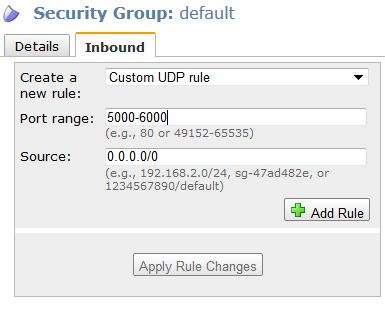UDP Message
The UDP trigger relays UDP messages. UDP is a simple datagram protocol that sends and receives data through specific UDP ports. Many sensor devices and mobile apps use UDP to publish live data. The data delivery is not guaranteed.
The UDP trigger has two output ports. The success port (✔) can send a message if the trigger receives it successfully. The failure port (x) can send a message if the trigger fails to receive one.
Note: The UDP trigger is not supported in a fault tolerant installation of FME Server.
Specifying UDP Ports
UDP ports cannot be duplicated across UDP triggers. There must be a unique UDP port for each UDP trigger.
When specific ports are desired, the port should be made available and not blocked by firewall settings. In the following example, Amazon Web Services firewall security settings are configured for an instance to reserve ports 5000 - 6000 (incoming) for the UDP trigger:

Note: See also Working with Parameters in Automations Workflows.
Tip: To test that your parameters work as expected, click Validate.
Output Keys
See Also
| Key | Description |
|---|---|
| time | Event time |
| source | Event type |
| error.type |
(Failure port only) Error type:
|
| error.message | (Failure port only) Error message |
| message | (Success port only) Message content |